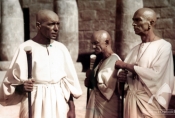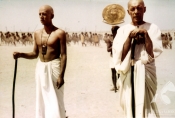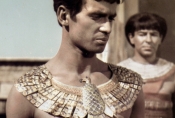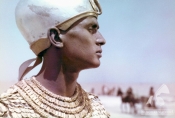THE PHARAOH [1965]
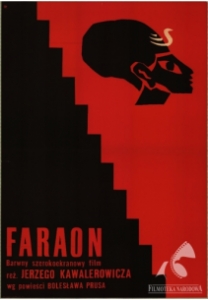
year:
- 1965
release date:
- 11 III 1966
runtime:
- 175 min
directed by:
- Jerzy Kawalerowicz
written by:
- Tadeusz Konwicki, Jerzy Kawalerowicz based on a story by Bolesław Prus
director of photography:
- Jerzy Wójcik, Wiesław Zdort
cast:
- Jerzy Zelnik [Ramzes XIII], Wiesława Mazurkiewicz [Queen Nikotris], Barbara Brylska [Kama], Krystyna Mikołajewska [Sara], Ewa Krzyżewska [Hebron], Piotr Pawłowski [Herhor], Leszek Herdegen [Pentuer], Stanisław Milski [High Priest Mefres], Kazimierz Opaliński [Beroes, a Chaldean prophet], Mieczysław Voit [a priest of Set], Alfred Łodziński [Hiram, a Tyrian prince], Andrzej Girtler [Ramzes XII]
edited by:
- Wiesława Otocka
music by:
- Adam Walaciński
production design:
- Jerzy Skrzepiński
produced by:
- Studio Filmowe „Kadr”
executive producer:
- Ludwik Hager
awards:
-
- State Award of the 1st degree 1966
- Golden Duck 1966 for Jerzy Kawalerowicz
- Nomination for the American Film Academy Award Oscar 1967
About the film
A timeless historical fresco, addressing the problems of power and revealing the mechanisms of statecraft and the influence of religion on social life. An enormous production, avant-garde in terms of methods and techniques of cinematography. Widely distributed abroad, it is one of the biggest commercial successes of Polish cinema.
Ramses, the successor to the throne in ancient Egypt, takes part in military training as a commander. Making difficult decisions comes easily to him, although he exhibits a certain degree of recklessness. Herhor, the high priest who is the Minister of War, notifies the Pharaoh about it. The monarch decides against entrusting his son with the promised command of the army. During his training, Ramses meets a beautiful Jewess, Sara, who becomes his mistress.
Ramses is distraught by the fact that the priests have too much influence on state policy and possess vast wealth, hidden in an underground maze, while the Pharaoh's treasury is empty. Ramses considers it necessary to start a war with Assyria in order to win and thus enrich the country. The priests, on the other hand, want peace and secretly prepare a treaty with the Assyrians in which they promise to give them Phoenicia. Concerned about this, Phoenician merchants become supporters of Prince Ramses. Meanwhile, unpaid Libyan regiments rebel. Ramses, as the head of an army, sets out to subdue the rebellion. During the fighting, he learns about the death of his father Ramses XII and the murder of Sarah and the son he fathered. They were killed by a Phoenician priestess, Kama, together with the Greek, Lykon, who bears a very strong resemblance to Ramses and who was prepared by the priests for the role of the heir’s double. Ramses becomes the pharaoh. He decides to reform the country and reclaim the treasures from the priests. A vote by the people is not unanimous in its support of the transfer of the wealth hidden in the maze to the state. Facing this situation, Ramses decides to storm the temple with the army and to imprison the high priests on charges of treason. With vast knowledge at their disposal, the priests know the dates of the upcoming eclipses of the sun and they use this wisdom for their own purposes. Several minutes before the eclipse, high priest Herhor addresses the troops and rebellious people. He calls out to the sun god, Amun, and the eclipse is accepted as evidence of the god's disfavour. The army is in panic. Ramses does not give up and intends to continue his fight against Herhor, but is killed by his double, Lykon.
Joanna Piątek, Leksykon polskich filmów fabularnych, Warszawa 1996
Articles
-
Loneliness, anguish, love nad consolation
Denitza Bantcheva
About Night Train, Mother Joan of the Angels, Pharaoh and The Inn

